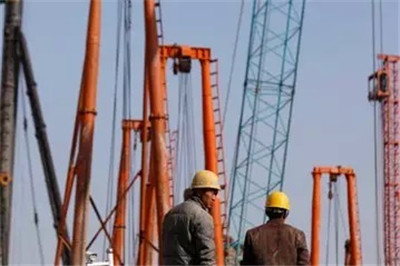(单词翻译:单击)
China’s State Statistical Bureau will today release one of the most eagerly awaited numbers in modern macroeconomics — the first-quarter growth figure for what is, by one measure, already the world’s largest economy.
中国国家统计局将于今日公布现代宏观经济学中最让人期待的数字之一,即按照某种衡量标准已经是全球最大经济体的中国经济的第一季度增长数字。

The scramble for this data is such that on March 5 reporters appeared at the Great Hall of the People at 2.30am for the release of the government’s annual growth target — all for a few seconds jump on a number that moves markets.
要获得中国经济增长数据的竞争是如此激烈,以至于3月5日记者们在凌晨2时30分就赶到人民大会堂守候,等待中国政府发布年度增长目标——即便只是为了抢先几秒钟报道一个足以改变市场行情的数字。
What should we be watching for?
有什么值得关注的看点?
One important number to watch will be net exports. Typically, this has little effect on growth as China needs to buy in raw materials to churn out what it ships overseas. Gavekal Dragonomics estimates that last year a relatively modest year-on-year increase in net exports deducted 0.3 percentage points from overall growth.
其中一个值得关注的重要数字将是净出口。通常情况下,这对经济增长影响不大,因为中国需要购买原材料,以便生产它向海外输出的制成品。龙洲经讯(Gavekal Dragonomics)估计,去年相对较小的净出口同比增幅使整体经济增长减少了0.3个百分点。
But the collapse in commodity prices — in part because of slowing growth in China — has pruned Beijing’s import bill, leading to record $60bn monthly trade surpluses in both January and February and a first quarter surplus six times larger than the same period last year.
但是,大宗商品价格的暴跌(部分原因就是中国经济增长放缓)削减了中国的进口账单,导致1月和2月都出现创纪录的600亿美元月度贸易顺差,而第一季度的顺差比去年同期大了6倍。
This surge in net exports will flatter China’s first-quarter growth figure, making it appear domestic demand is stronger than it is and adding to fears about deflation.
净出口的这种激增将提振中国第一季度的增长数字,使内需显得比实际更为强劲,并加大人们对通缩的担心。
So are deflation fears warranted?
那么通缩恐惧有道理吗?
Not according to government officials, who argue that inflation of just 1.4 per cent — much less than their 3 per cent target — reflects falling commodity prices abroad and bumper harvests at home. Food accounts for more than a third of China’s consumer price index.
按政府官员的说法是没有必要感到恐惧的,他们提出,仅为1.4%的通胀率(远低于3%的目标)是由于海外不断下降的大宗商品价格和国内的农作物好收成。食品占中国消费价格指数(CPI)的三分之一以上。
But worries clearly persist. China’s central bank has cut benchmark interest rates twice over the past four months and trimmed commercial banks’ reserve requirements.
但人们的忧虑显然挥之不去。中国央行已经在过去四个月两次下调基准利率,还削减了商业银行的存款准备金率。
Is the ‘new normal’ slow growth plus deflation?
“新常态”是慢速增长加上通缩吗?
Possibly. Officials are confident these measures will help maintain growth at its so-called “new normal” of 7 per cent. But other economists fret about a scenario in which the economy continues its slow but steady descent despite repeated cuts in interest rates.
有可能。官员们相信,上述措施将有助于保持增长,达到7%的所谓“新常态”。但其他经济学家担心出现这样一种情形:尽管一再下调利率,但经济增长继续缓慢而稳步地减速。
The International Monetary Fund, for example, predicts that China’s economy will expand 6.8 per cent this year and 6.5 per cent in 2016, with the latter figure potentially lower than India’s for the first time in decades.
例如,国际货币基金组织(IMF)预测,中国经济今年将增长6.8%,明年将增长6.5%,后一个数字可能意味着中国经济增幅几十年来将首次低于印度。
Add in the Fed raising rates and is it a recipe for capital flight?
再加上美联储(Fed)加息,这会不会是成为引发资本外逃的配方?
In the past a similar scenario has prompted China to occasionally hold the renminbi at a level many economists felt meant the currency was undervalued, to the dismay of the US.
以往,类似的情形有几次促使中国将人民币汇率控制在许多经济学家觉得偏低的水平,这使美国不快。
For now, China is more focused on supporting its currency. Through the daily trading limits and other safeguards China has constructed around its managed currency, the central bank has struggled to arrest the renminbi’s slide against the dollar over recent months.
就目前而言,中国在更多侧重于支持人民币。通过每日交易浮动区间以及中国围绕其有管理的汇率制度构建的其它保障措施,中国央行近几个月来竭力遏止人民币相对于美元走低。
That, Chinese officials argue, is more reflective of the dollar’s strength than any deliberate policy by Beijing.
中国官员们辩称,人民币兑美元汇率走低在更大程度上反映了美元的强势,而非北京方面任何刻意的政策。
Officials say they would rather keep the currency rate stable, creating a survival-of-the-fittest environment in which only the most innovative of companies thrive, creating jobs and boosting the economy. If realised, that vision would be better than any state stimulus.
官员们表示,他们宁愿保持汇率稳定,营造一个适者生存的环境,让最具创新性的企业茁壮成长,从而创造就业,提振经济。若能实现这一愿景,将比任何政府刺激计划更好。


